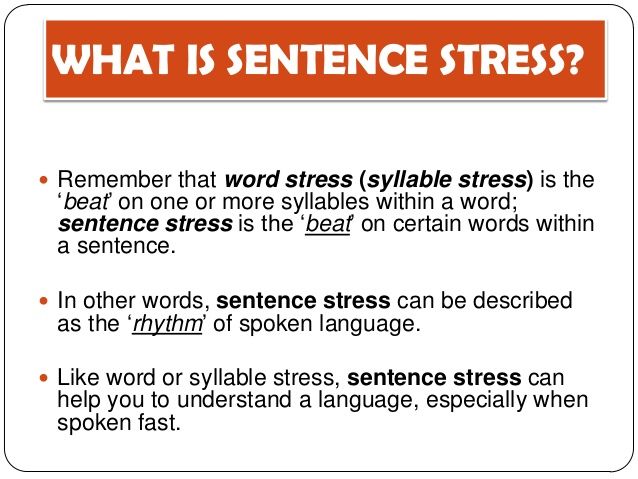Stress: an essential element of rhythm, which is the most distinctive feature of the English language. Word stress is not used in Japanese or Spanish, where each syllable is pronounced with eq-ual em-pha-sis.
Roach (1983:73) identifies the four characteristics that make a syllable stressed. A stressed syllable;
1. is louder,
2. is longer,
3. has a higher pitch, and
4. contains a vowel different in quality from the neighboring vowels.
Word stress is not an optional extra that you can add to the English language if you want. It is part of the language! English speakers use word stress to communicate rapidly and accurately, even in difficult conditions. If, for example, you do not hear a word clearly, you can still understand the word because of the position of the stress.
Think about these two words: photograph and photographer… Imagine that you are speaking to somebody by telephone over a very bad line. You cannot hear clearly. In fact, you hear only the first two syllables of one of these words, photo… Which word is it, photograph or photographer? Of course, with word stress you will know immediately which word it is because in reality you will hear either PHOto… or phoTO… So without hearing the whole word, you probably know what the word is (PHOto…graph or phoTO…grapher). Of course, you also have the ‘context’ of your conversation to help you.
Φ Suffixes are usually unstressed. Here are a few exceptions (mostly of French origin) where the suffix carries the stress
 –ee, –eer, –ette, –ique, –ese, –esque, –esce, –ain (for verbs only)
–ee, –eer, –ette, –ique, –ese, –esque, –esce, –ain (for verbs only)
When applied to a stem, these suffixes will shift the stress to themselves. Some examples are: picturesque, grotesque, fluorescent, evanescence, brunette, diskette, technique, physique, critique, etc.
For –ee and –eer, some examples are employee, guarantee, volunteer, engineer, etc. There might be a secondary stress placed in the originally stressed syllable of the stem, but the primary stress will definitely be on the suffix: engineer (en-gi-nEER).
Verbs which end in –ain (not nouns!) will be stressed on the suffix: retain, maintain, entertain…
The suffix –ese will be stressed if the words which carry it are not followed by nouns: Portuguese, Japanese, Chinese… but the stress will shift to the left if they are followed by a noun: Portuguese language, Japanese food, Chinese restaurant…
•→http://www.englishclub.com/pronunciation/sentence-stress.htm⇐
•→WORD STRESS ←click for practice with multifunctional words.
•→wordstress.info/Stress-Pattern-Change-noun-verb-pairs.pdf⇐
• Click on→ stress on COMPOUND nouns← for an instructive chart.
Φ Contrastive stress ⇐[quiz]
There is one word in most phrases that receives the phrase (sentence) stress under ordinary occasions. However, the stress can always be shifted from this normal place to some other place in the sentence. This shifting always changes the meaning of the phrase somewhat or makes it fit into some special context.
The simple sentence below can have many levels of meaning based on the word you stress according to the contrastive choices. The stressed words are written in bold.
1. ‘I don’t think he should get the job.’
Meaning: Somebody else thinks he should get the job.
2. ‘I don’t think he should get the job.’
Meaning: It’s not true that I think he should get the job.
3. ‘I don’t think he should get the job.’
Meaning: That’s not really what I mean. Or I’m not sure he’ll get the job.
4. ‘I don’t think he should get the job.’
Meaning: Somebody else should get the job.
5. ‘I don’t think he should get the job.’
Meaning: In my opinion it is wrong that he is going to get the job.
6. ‘I don’t think he should get the job.’
Meaning: He should have to earn that job.
7. ‘I don’t think he should get the job.’
Meaning: He should get another job.
8. ‘I don’t think he should get the job.’
Meaning: Maybe he should get something else instead.
⇓ Changing Meaning through Word Stress⇐
I didn’t say he stole the money. I didn’t say he stole the money. I didn’t say he stole the money. I didn’t say he stole the money. I didn’t say he stole the money. I didn’t say he stole the money. I didn’t say he stole the money.• Exercise:
Say each sentence aloud using the stress word marked in bold. Then match them [1-7] to the meanings below [a-g].
1. I said she might consider a new haircut
2. I said she might consider a new haircut
3. I said she might consider a new haircut
4. I said she might consider a new haircut
5. I said she might consider a new haircut
6. I said she might consider a new haircut
7. I said she might consider a new haircut
a. Not just a haircut
b. It’s a possibility
c. It was my idea
d. Not something else
e. Don’t you understand me?
f. Not another person
g. She should think about it. It’s a good idea
•→www.learning-english-online.net/pronunciation/stress-and-intonation⇐
⇓ Stress Maze (basic) / ⇒ Stress maze (interm) ⇐ / Stress Maze (adv) ⇓
• More quizzes . . . ⇒ [01] ⇔ [02] ⇐
∇ Sentence stress ⇐
⇒ CONTENT WORDS vs. function words ⇐
¶ Stress & Rhythm ↓
♦→ English A Stress-Timed Language ⇐
Rachel often refers to American English, but what she says applies equally well to ALL varieties of English, as spoken everyfuckingwhere.
In this American English pronunciation video, we’re going to go over why some words sound different when they’re said on their own than they do when they’re said as part of a sentence, like ‘for’, ‘fer’.
A lot of people think, when they’re studying a language and they’re new to it, that they need to pronounce each word fully and clearly in order to be well-understood. But in English that’s actually not the case. English is a stress-timed language. That means some syllables will be longer, and some will be shorter. Many languages, however, are syllable-timed, which means each syllable has the same length. Examples of syllable-timed languages: French, Spanish, Cantonese. So, when an American hears a sentence of English, with each syllable having the same length, it takes just a little bit longer to get the meaning. This is because we are used to stressed syllables, syllables that will pop out of the line because they’re longer and they have more shape. Our ears, our brains, go straight to those words. Those are the content words. When all syllables are the same length, then there’s no way for the ear to know which words are the most important.
So this is why stress is so important in American English. It’s a stress-timed language. When you give us nice shape in your stressed syllables, you’re giving us the meaning of the sentence. This means that other syllables need to be unstressed — flatter, quicker — so that the stressed syllables are what the ear goes to. This is why it’s so important to reduce function words that can reduce in American English. When those function words are part of a whole, part of a sentence, they are pronounced differently. Let’s look at some examples.
—-. Do you know what I’m saying? A native speaker might not either. But, in the context of a sentence, «I’m going to the store,» a native speaker would know exactly what I was saying. I’m going to the store. I’m going to the store. When ‘to the’ is pronounced —- (reduced and linked), ‘going’ and ‘store’ become the obvious words in that sentence. I’m going to the store.
What about —-? Can you understand what I’m saying? A native speaker might not either. But, in the sentence fragment «Because of my job,» «Because of my job,» a native speaker would know exactly what I was saying. Because of my job. Because of my job. ‘Because’ and ‘of’ are so unstressed, so reduced and low in pitch, that the word ‘job’ is able to really jump out of the sentence. Because of my job.
This is really of primary importance in American English pronunciation. As you’re working on pronunciation, keep in mind this idea of a word being part of a whole.
The word ‘for’: part of a word becomes fer, fer, fer you, fer me, fer dinner. Practice it this way. Drill it over and over. Other words that can reduce: ‘and’ can become ‘n’. ‘Them’ can become ‘thum’ or ‘em’. ‘At’ can become ‘ut’. ‘To’ can become ‘tuh’ or ‘duh’. ‘Can’ can become ‘kun’, ‘kun’. ‘Are’ can become ‘er’, ‘er’. ‘Was’ can become ‘wuz’, ‘wuz’. ‘That’ can become ‘thut’, ‘thut’. ‘Your’ can become ‘yer’, ‘yer’. ‘At the’ can become ‘ut the’, ‘ut the’. And so on. So keep an eye out for this as you’re studying pronunciation and listening to native speakers.
That’s it, and thanks so much for using Rachel’s English.
♦ Stress Timing Pronunciation Practice ↓ (Mural Story)









Wow, incredible blog layout! How long have you been blogging for? you make blogging look easy. The overall look of your website is wonderful, as effectively as the content material!
I really like your writing style, good info , regards for putting up : D.
This site is my breathing in, very wonderful design and perfect content .
so much wonderful info on here, : D.
Appreciate it for all your efforts that you have put in this. very interesting info .
I like this blog very much so much excellent information.
Enjoyed studying this, very good stuff, thankyou .